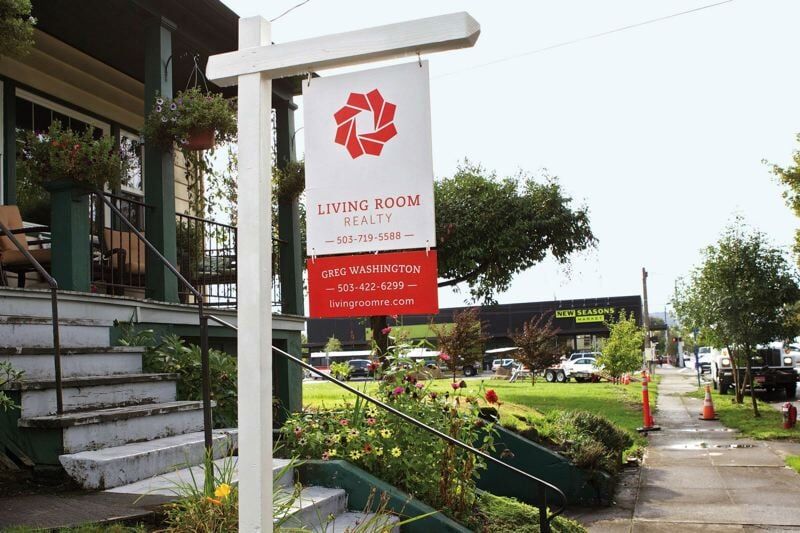Portland closer to requiring Home Energy Scores, energy audits, for home listings
Published 12:00 am Thursday, December 8, 2016

- The City Council is expected to require most owners of single-family homes to commissioner an energy audit before selling them on Wednesday.
Starting in 2018, those who sell homes in Portland likely will have to commission a home energy audit to determine a Home Energy Score, providing those to prospective home buyers.
Trending
A Home Energy Score, akin to a miles-per-gallon sticker on cars for sale, will alert buyers what to expect in home energy bills, and it’s hoped, spur improvements that cut down on energy use and carbon emissions.
On Wednesday, the Portland City Council approved two amendments to the policy, setting the stage for granting final approval on Dec. 14.
“If we’re going to be serious about avoiding the catastrophic effects of climate change, we have to move more things faster,” said Mayor Charlie Hales, who championed the policy and made it part of his “bucket list” before he leaves office at year end. “A thousand things add up, and this is one of them,” Hales said.
Trending
The main amendment adopted by the council eliminated a requirement that the results be posted on the city’s Portland Maps website. Critics had complained posting the results on the Internet would be obtrusive, and the results might be stale if homeowners subsequently made improvements to their house.
Instead, the results must be available when a house is for sale, to prospective buyers. However, the ordinance will require the full energy reports be placed on real estate listing services that allow them.
The Home Energy Score will thus have a shorter shelf life and presumably, less impact.
But “this is a long-term transformational game,” said Andria Jacob, the clean energy program manager for the Bureau of Planning and Sustainability. “Over time, people will start to understand what that score means.”
The council also exempted low-income sellers from the ordinance. However, the city already has a foundation interested in covering the roughly $200 cost of a Home Energy Score for low-income sellers, Jacob said.
The policy comes up for final approval next Wednesday, though councilors indicated their minds are made up.
“Obviously, this is something the council supports,” Hales said as the body wrapped up work on the amendments.
The council rejected a request by homebuilders to exempt new homes from the requirement.
At the initial hearing on the Home Energy Score, builder Justin Wood testified that most new homes would score at least a nine on the 10-point scale because of strict energy-code requirements in Oregon, rendering the process meaningless.
But city staff went back and checked how new homes would have scored, and found half scored lower than eight out of 10, said Michael Armstrong, deputy director of the Bureau of Planning and Sustainability.
The Portland Metropolitan Association of Realtors, which testified against posting the Home Energy Scores on Portland Maps, appreciated the decision to scrap that idea, said Jane Leo, government affairs director.
However, the trade group, which has spearheaded a campaign against the Home Energy Score, still opposes the idea.
About 35 percent of Portland’s housing stock was built before 1940, and those homes will find it hard to compete with newer, energy-efficient homes on the basis of Home Energy Scores, Leo said. Home buyers might walk away from such homes, or lenders might decline granting loans needed by the would-be buyers, she said. “A low score can result in a loan being denied and the transaction falling apart.”
About 600 letters opposed to the Home Energy Score were sent to the city by Realtors. The trade group set up a website, nocostlymandates.com, and a digital media campaign directing people to that website. In addition, the Realtors recently mailed more than 30,000 tear-off postcards to Portland households with registered voters, Leo said.
Commissioner Amanda Fritz requested that the ordinance be passed without an emergency clause, which could give opponents time to gather signatures for a referendum to overturn it. It’s not clear yet what the Realtors might do if the council passes the measure next week, Leo said.
The city and state have already made considerable efforts to foster home weatherization, insulation and other improvements to shave energy use. Customers of PGE, Pacific Power and NW Natural pay a tax on their energy bills that is directed to Energy Trust of Oregon, which offers subsidies to help individuals and businesses save energy and promote renewable sources.
The city created what it now called Enhabit, (formerly Clean Energy Works), a nonprofit that enables homeowners to pay the costs of energy-efficiency improvements on their utility bills.
Despite such efforts, experts say relatively few people are taking advantage. The main culprit, Jacob said, is the historically low price of natural gas, which has been driven down through relatively new “fracking” extraction techniques. That has made it harder for Energy Trust and others to justify some home energy improvements, because they don’t cost out as well as before.
Other cities like Austin and Berkeley have pioneered the use of Home Energy Scores when homes are sold. However, Portland’s system will be the first in the country to require the scores and report as soon as a home is listed for sale, Jacob said.
It was not lost on city commissioners that they were taking action against climate change on the same day President-elect Donald Trump announced his nominee to lead the Environmental Protection Agency, Oklahoma Attorney General Scott Pruitt, a prominent climate-change denier closely aligned with the fossil fuel industry.
Hales recently returned from a meeting of the C40 Climate Leadership Group in Mexico City, which began as an effort among 40 large world cities to tackle climate change.
It’s somewhat comforting, Commissioner Steve Novick said, to know that cities can directly address about 40 percent of the carbon emissions problem, despite a lack of interest by the incoming U.S. administration.
Hales noted that the C40 effort now numbers 90 big cities, including Portland, with a total population of 600 million people.
“Cities are making a difference,” he said. “There are thousands of actions that have to be taken.”







